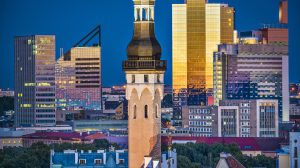A selection of articles about emerging Europe published elsewhere this week, all of which caught our eye and all of which are well worth your time. Listing them here, however, does not necessarily mean that we agree with every word, nor do they necessarily reflect Emerging Europe’s editorial policy.
Like many companies in central Europe, Amica has been struggling to find workers. So last year, the Polish manufacturer of household appliances took an unorthodox decision: To help staff up a new factory near Wronki in western Poland, it struck a deal with a local prison to employ between 100 and 200 inmates.
—
Staying in Poland, the country’s governing Law and Justice party used to get political mileage out of vilifying refugees. Now it has its sights on the LGBT community, reports Balkan Insight.
—
Created by the communist regime to stave off anti-socialist feeling, a Bulgarian female choir which championed by 1980s goths and worked with Kate Bush and Bobby McFerrin has just released their first new album in 20 years. IN an interview with The Guardian, they explain their alien sound.
—
On June 19 the former Romanian Prime Minister Dacian Cioloș was elected president of the rebranded liberal group in the European Parliament, Renew Europe. This is a breakthrough for the new movement in emerging Europe and in rural constituencies, key objectives for the liberal platform.
—
The Nord Stream II pipeline gave birth to a seemingly united front among several Central and Eastern European states objecting to the project, including the Czech Republic, Slovakia, Hungary and Poland. That, however, is far from the truth, writes Martin Jirušek in Euractiv.
—
The protest camp in Chişinau: Moldovan protesters decry corruption as they face accusations of their own.
–
In recent years, most of the debate around the global migration of people has focused on the movement into developed countries and the political battles that ensue. But we seldom talk about the places which, year after year, see more people leave than arrive, and the consequences of countries saying goodbye to some of their best and brightest—often for good. Nowhere is this concern more pressing than in Eastern Europe.
—
Enver Hoxha’s villa in central Tirana, once sealed off by the Albanian secret service and home to party elites, is to be opened to the public.






Add Comment